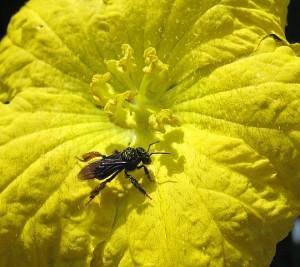Small-farms in developing countries from Africa, Asian and Latin America that are struggling with their amount of crop production need a little boost to help get them back to their normal yield. Could the addition of native pollinators be what small-farms need to increase their yield gap?
Before I get into this, let’s refresh our knowledge about pollination.
Pollinators such as honey bees, beetles, and wasps help plants reproduce, which means they play a crucial role in agriculture.
How do they do this?
The main function of pollen is to produce male sperm cells. Pollination basically occurs when pollen is transferred to female reproductive organs of plants which allows fertilization and reproduction to occur. Native pollinators such as the few listed above are able to enhance pollination which helps out farmers with their crops.

“Honey bee, covered with pollen, visiting a flower of the Vegetable Sponge Gourd” By Leonardo Ré-Jorge.
Here is a video by Laura Klahre on TEDx Talks that discusses the different types of bees that are effective pollinators.
If pollinators are able to do this, then could these native pollinators effectively help struggling farmers with their yield?
A recent study discusses the effectiveness of implementing new pollinators to help small-farms that are struggling with crop production. It was done on “344 fields from 33 pollinator-dependant crop systems in small and large farms from Africa, Asia, and Latin America”. This study greatly affects under-developed countries that are reliant on their small-farms for food.
The study found that incorporating the new pollinators could potentially close the yield gap of farms by about a quarter; the yield gap being closed by a quarter was found on small fields that were less than 2 hectares.
The study suggests that ecological intensification or a “biodiversity of pollinators” will improve yield outcomes for the farms of these under-developed countries. Biodiversity of pollinators are just means to incorporate a diversity of different pollinators into the farms.
Introducing pollinators has shown to have a positive effect on these farms. It could be the method that struggling small-farms use to help get their farms a higher yield, so why not give it a chance?
Post by Karanvir Gill.
